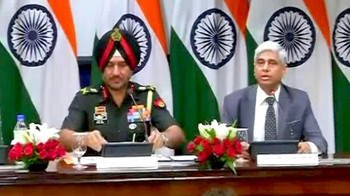New Delhi, Sep 29: India conducted surgical strikes on terror launch pads last night across the Line of Control (LoC) and inflicted significant casualties and heavy damages.
 The announcement of the sudden action by the army to target terrorists was made by the DGMO Lt Gen Ranveer Singh at a hurriedly called news conference during which External affairs ministry spokesman Vikas Swarup was also present.
The announcement of the sudden action by the army to target terrorists was made by the DGMO Lt Gen Ranveer Singh at a hurriedly called news conference during which External affairs ministry spokesman Vikas Swarup was also present.
Gen Singh said India shared with Pak army details of the surgical strikes which followed "very specific information" that terrorists were positioning themselves in the launch pads along the LoC.
Details of duration of the surgical strikes or when it was conducted or the place was not immediately given.
"Indian Army conducted surgical strikes last night on terror launch pads across the Line of Control(LoC)," Singh said, adding India was ready for any kind of contingency.
Gen Singh said heavy damages were caused to the terror camps and there were significant casualties, adding that as of now there was no plan for further operation.
Sources said that at least two terror camps were struck during the surgical strikes.
"We can't allow terrorists to operate across the LoC. There has been a surge in infiltration," Gen Singh said.
Gen Singh said the operation to neutralise terrorists has since ceased and "we don't have any plans for any further operation as of now" but added the armed forces will not allow terrorists to carry out any attacks in J and K or any major Indian cities.
He said the strikes were launched after getting "very specific and credible" intelligence input that the infiltrators were being pushed to carry out attacks in Jammu and Kashmir and in some major Indian cities.
Sharif condemns Indian aggression along LoC
Islamabad, Sep 29: Strongly condemning "unprovoked and naked aggression" by India along the LoC, Prime Minister Nawaz Sharif today said Pakistan's armed forces are fully capable of defending the territorial integrity of the country.
 Sharif also warned that Pakistan's intent for peaceful neighbourhood should not be mistaken as its weakness, Radio Pakistan reported.
Sharif also warned that Pakistan's intent for peaceful neighbourhood should not be mistaken as its weakness, Radio Pakistan reported.
He said Pakistan can thwart any "evil design" to undermine its sovereignty. He strongly condemned the "unprovoked and naked aggression of Indian forces along the Line of Control".
Meanwhile the Pakistan military said two of its soldiers were killed in ceasefire violation by India along the LoC today. Sharif paid rich tributes to jawans who have been killed in the firing.
In New Delhi, India said it has conducted surgical strikes on terror launch pads last night across the LoC and inflicted significant casualties and heavy damages.
DGMO Lt Gen Ranveer Singh said India shared with Pakistan army details of the surgical strikes which followed "very specific information" that terrorists were positioning themselves in the launch pads along the LoC.
Details of duration of the surgical strikes or when it was conducted or the place was not immediately given.
Pakistani troops had yesterday targeted Indian positions with small firearms along the Line of Control in Poonch district.





Comments
Good India....Keep it up...We are proud of Indian army and Indian government.
Good India...Keep it up...We are proud of Indian army and Indian government.
be ready for Pakistani army's reaction
Surgical strikes with Mortars yes, if you name it. Pak also hit back with Mortar's surgical strikes. New military jargon Mortars, light Artillery and Heavy Machine Guns in Surgical strikes. Both sides are doing the same since long.
Lies and fake escalation from India...only to convince and disguise the Indian Nation to hide their failure...
There is no proof of surgical strike...although Mumbai STOCK exchange has been crashed by 500 points !
jai hind!!! We need to attack few more times!!!
This is not at all good news guys. War is never a solution
This will serve the purpose of serving notice to Jehadi groups that they will have to face the consequesnces also of their actions.
Congratulations to the Policy makers and Hats Off to the Indian Army. We have to remain pro active and take up defencive offence to keep the enemy at bay and deny any success to enemy''s evil designs.
Add new comment